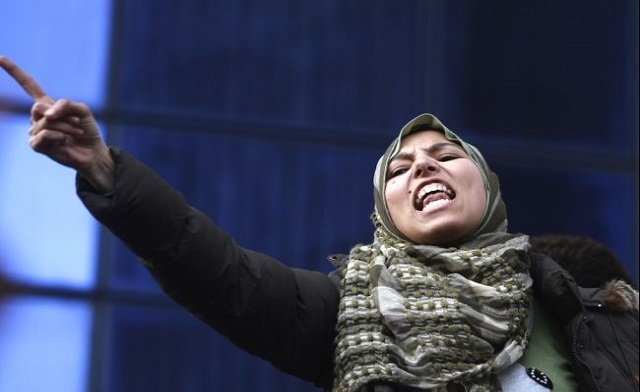In what is now quickly becoming a tired old soap opera with predictable script, a beleaguered cast, and an angry audience, US President George W. Bush has yet again promised to declare victory in Iraq and bring the troops home . by sending in more troops.
Those should be catchphrases of American pop culture: “Victory in Iraq ; “Bring the troops home ; “Islamic Fascists ; “War on terrorism .
Enough.
The US President has consistently and persistently lied, not to the world, but more importantly to an American public that clearly does not want a troop buildup.
What happened to “We the People ?
Bush has promised difficult times ahead – as if the times just laid to rest were a picnic – and proposed a bold new change of strategy to destroy Iraqi militias and stabilize the war-ravaged, oil-rich Arab nation.
He suggested sending a further 21,500 troops to Iraq. This is Vietnam-era folly.
He also said he wanted to improve Iraqi security forces so that they better protect the civilian population. Let’s ask the civilian population what they think of this. Iraqis do not trust the Iraqi police, nor the amusingly termed Iraqi National Army, nor the security guards deployed outside ministries because they are known to be the core of all the death squad killings.
A constant trickle of reports written by American strategists has pointed, begrudgingly at the alarming rate of “trained personnel who quickly join the various militia.
Bush went on to say he will establish political benchmarks for the Iraqi government, but that is laughable were it not fatal. It is the Iraqi government which is the enemy of its people. A recent poll showed that 90 percent of Iraqis believed times prior to the invasion were far better than the current spiral of violence.
And who ruled prior to the invasion? Ah, but we hanged that despot, right?
Iraq now is a nation of despots, dozens of despots some ruling on their own behalf, others in the employ of Iran, Israel . take your pick, Taiwan, perhaps.
Mr. President, the Iraqi government and its militia masquerading as security forces are your problem. Setting benchmarks and hosting SCIRI’s Hakim in Washington is akin to the Arab dunce Juha who scratches his left ear with his right hand.
Then we hear of the brave new economic package for Iraq – $1 billion to create new jobs and fund reconstruction.
What an insult. What happened to the $18 billion a US auditor said has gone missing or been misappropriated in the past years? What about the nearly 2000 projects which never got off the ground, were stalled, or halted in Iraq?
$1 billion will buy plenty of new drills for the terrorists in the Iraqi government to use on its own population.
And finally, Bush blames Syria and Iran, which is ironic since most Arab governments now openly accuse the US of colluding with Iran in Iraq.
In the first year of this war, American journalists warned that a Vietnam was over the horizon. They were quickly called traitors, wimps, weak, etc.
By the second year, the V-word began to surface more on blogs and columns. Mainstream media would not dare touch it. By the third year and as we approach the fourth year, Bush himself has alluded to the Vietnam complex.
Too late.
Iraq will far outpace Vietnam as the greatest foreign policy and military debacle in US history. And US politicians and congressmen and women warned of this so far ago.
People like the distinguished Vietnam war hero Pennsylvania’s Congressman John Murtha who urged troops be brought home. A disabled veteran, this gentleman was ostracized for daring to speak the truth on Iraq.
For talking about the massacres in Haditha and why they happened. Push a soldier too far and they snap.
I am not excusing their criminal actions, but one cannot dispel what led to the killing of Iraqi civilians. US soldiers are after all human, and given the right set of conditions and pressures, they react violently. Stress, loneliness, disillusionment – this is part and parcel of military history.
Pressures of a military stretched to thin.
And now stretched even thinner.
But America is not the heart of the Iraq question, so apologies for digressing somewhat.
It is Iraq and its people that is the heart of the Iraq question. In previous pieces I have called Iraqis the forgotten victims of the 21st century holocaust.
In the midst of all the political wrangling and deliberations of foreign governments, the plight of the Iraqi people has become a passing mention in a newspaper or television report.
Nearly 400 Iraqis are killed in Baghdad alone every day. The daily killings and kidnappings have so desensitized the viewer from the reality of the situation that one cannot help but merely shrug the shoulders. This is the story of Iraq as told by its people over the past 1390 days.
Life in Iraq has offered a daily ritual of suffering and agony which the world community has tired of. But the killings are increasing at a frightening rate.
Planning as saying that it finds nearly 400 Iraqis are killed in Baghdad alone every day.
These are 400 stories that go untold every day by the foreign press which instead has fixated itself with photo opportunities and mere public relations events.
For example, in the headlines we read such items as Bush says timely action needed on Iraq, but that translates into empty rhetoric when taking into consideration how Iraqis themselves are forced to live.
In the past few weeks alone, shoppers have been targeted in marketplaces they have frequented for decades. Buying fruit and vegetables with their meager holdings, men, women, and children are torn apart by car bombs and suicide attacks.
In the hospitals there is a lack of medicine, equipment and even qualified personnel. Most doctors with any means have left Iraq for Syria, Turkey, Jordan, Dubai and Egypt.
In these countries they festoon the streets queuing up in lines for immigration to New Zealand, Canada, and the US, Australia, Sweden, Germany and other Western nations.
Those who fail to meet immigration standards then apply for refugee status with the United Nations High Commissioner for Refugees (UNHCR). After once closing the door on officially recognizing Iraqis as refugees following the March 2003 invasion, the UNHCR has reversed its policy and is now facilitating the transfer of refugees to the West.
In October, during one such course of action, a US immigration judge arrived in Amman to interview 30 Iraqi families who had applied for refugee status through the UNHCR.
The stories they had to tell were gut-wrenching. Some had witnessed firsthand the assassination of their kin; others were threatened with execution if they continued to teach English, paint, or play music.
Of the 30, the judge granted refugee status to only eight families. The fate of the remaining 22 will also surely become a story untold.
There are currently four million displaced Iraqis. Amidst the killing fields of Baghdad, Ramadi, and Baquba, to name a few, there are a further 600,000 internally displaced Iraqis. They live in tents because the flux of refugees within Iraq has overwhelmed many communities.
In their efforts to escape sectarian turf war – the purging of Shiites from East Baghdad and Sunnis from West Baghdad – they have become forgotten victims of their own country, the price of liberation that is not factored into the speeches Maliki and Bush read from placards.
The situation in Iraq has so deteriorated that university professors no longer teach classes, fearing kidnapping or assassination. The mass kidnapping of staff at the Ministry of Higher Education in Baghdad last month highlighted that even academia is threatened.
According to Iraqi academics who have managed to leave Iraq, some 400 of their numbers have been killed in the past three years – a shocking and calculated destruction of Iraq’s brainpower.
Sports, athletics, science, art, film – all industries which have sacrificed their practitioners: tennis coaches killed because they wore shorts, members of a judo team abducted and beaten, advanced sciences professors assassi
nated in their cars as they left their homes, painters and sculptors found murdered, and popular comedy actors murdered.
Those who work in the media in Iraq know they live on borrowed time. Iraqi satellite channels looking to hire new personnel usually include disclaimers that the job is not for the faint-hearted and carries serious risk and/or bodily harm.
This is the wanted advertisement for a journalist, not a Green Beret soldier, not a policeman.
Mixed Shiite-Sunni marriages, once prevalent in Iraq, have ground to a halt and existing couples find they can no longer sustain themselves.
Divorce in Iraq is peaking because of the political realities – love and marriage are being sacrificed on the altar of failed US foreign policy, Arab inaction, and hubris.
In one Baghdad neighborhood, a Shiite man killed his Sunni brother-in-law after an attack on Sadr City killed 200 Shiite shoppers. Two children were left fatherless.
But do these stories make it to the front pages of any global newspaper? No. They remain buried with the victims, the stories whispered among relatives and neighbors, emailed from one Iraqi to another.
In the meantime, a scattered Iraqi nation continues to suffer its dismemberment, hoping and praying that the human cost of the US misadventure is acknowledged and eventually removed. Firas Al-Atraqchi is the Editor of The Daily Star Egypt



